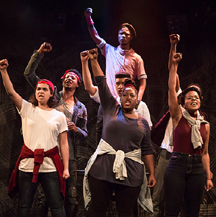Edutainment is not always entertaining, nevertheless comical. However, “The Fall” at Washington’s Studio Theatre is just that, plus educational and cross-cultural. With the creators and most of the cast having been a part of the depicted protests, the 80-minute play imported directly from South Africa reflects their experiences as student protest leaders at the University of Cape Town.
Yea, the singing and dance moves were great, but the dialogue was riveting as the Baxter Theatre Centre at the University of Cape Town students revealed their varied truths mostly on racism and White Supremacy from a South African perspective. One student talked of being labeled a “coconut” (“oreo”). Another reminded the other leaders that “you were colonized with a Bible and a gun,” as they discussed how to remove the White supremacist, colonizer, and imperialist Cecil Rhodes’ statue, and finally did it.
Offstage, much chatter has focused on how Whites around the world have been reacting to immigration of non-Whites and the browning of countries. We have discussed Brexit in the United Kingdom and trumpism in the United States. This play offers a refreshing platform to alter that dialogue to the dismantling of White Supremacy from Cape Town to Charlottesville, from Baltimore to Banjul.
Review: South African Style
The play undergirds that distance has not broken the cultural ties between Africans at home and those abroad. And the experiences with White supremacy in separate territories have left Africans around the world with united reactions. The conversations these Cape Town students had are the same I had at Iowa State University in 1978-81 (and the Blacks students are probably still having) - - sometimes the lines were very funny because I have lived them.
Nevertheless, while the play demonstrated how diverse factions peddled toward unity around dismantling a symbol of hatred, the excrement hit the fan as the intragroup wounds opened with rapid-fired discussions on “hyper masculinity,” sexism, colorism, and sexual identity. After the fall of the statue, one protestor asserted, “I am also a queer, Muslim woman.”
Port Of Harlem readers Carol Francois of Lorton, Virginia and Nedra James of Bladensburg, Maryland won the last issue’s drawing to see this play filled with political and social commentary. While such plays can be heavy on the brain and light on the heart, this play is filled with good, creative, thought-provoking dialogue that displayed a Pan-African perspective not from an American view, but with dramatic South African style.
Video Clip: “The Fall”
Note: Feds Spending Millions to Beef Up Security at Confederate Monuments, Cemeteries
Nevertheless, while the play demonstrated how diverse factions peddled toward unity around dismantling a symbol of hatred, the excrement hit the fan as the intragroup wounds opened with rapid-fired discussions on “hyper masculinity,” sexism, colorism, and sexual identity. After the fall of the statue, one protestor asserted, “I am also a queer, Muslim woman.”
Port Of Harlem readers Carol Francois of Lorton, Virginia and Nedra James of Bladensburg, Maryland won the last issue’s drawing to see this play filled with political and social commentary. While such plays can be heavy on the brain and light on the heart, this play is filled with good, creative, thought-provoking dialogue that displayed a Pan-African perspective not from an American view, but with dramatic South African style.
Video Clip: “The Fall”
Note: Feds Spending Millions to Beef Up Security at Confederate Monuments, Cemeteries
Advertisers | Contact Us | Events | Links | Media Kit | Our Company | Payments Pier
Press Room | Print Cover Stories Archives | Electronic Issues and Talk Radio Archives | Writer's Guidelines







